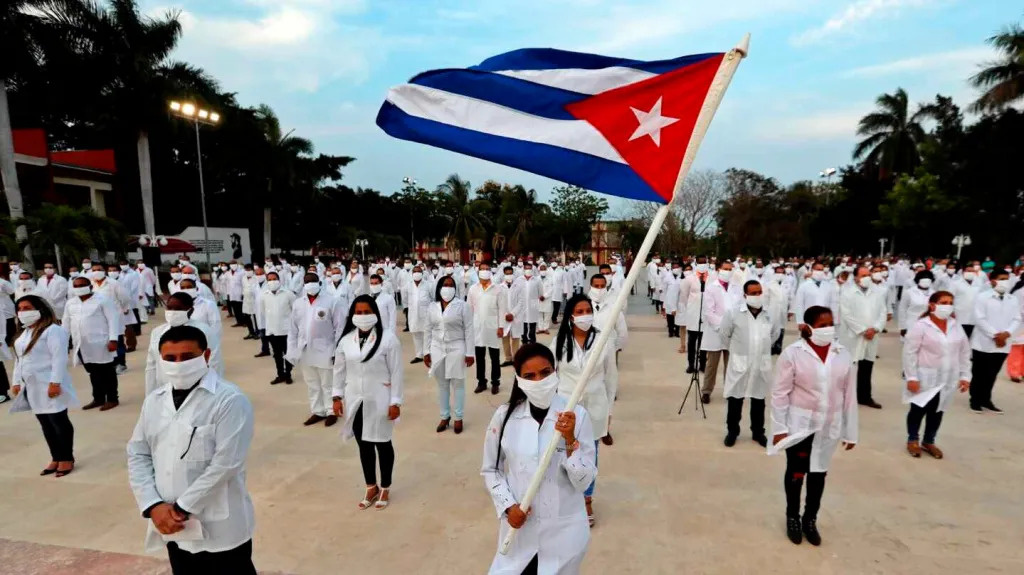The measure seeks to punish those who benefit from the “rental” of health professionals, a multi-million dollar business for the Havana regime.

![]() 14ymedio, Havana, 13 August 2025 — The US government announced on Wednesday new visa restrictions against officials as well as their families, from Cuba and several African countries and Grenada for their involvement in what the State Department describes as a program of “export of forced labor” directed by the Cuban regime.
14ymedio, Havana, 13 August 2025 — The US government announced on Wednesday new visa restrictions against officials as well as their families, from Cuba and several African countries and Grenada for their involvement in what the State Department describes as a program of “export of forced labor” directed by the Cuban regime.
In a statement issued by the Office of the Spokesman, Washington said that the sanctions target government officials who facilitate or benefit from Cuban medical missions abroad, although the names of those sanctioned are not yet known. According to the note, these missions involve “coercion” of health professionals, who are sent to work in other countries under opaque contracts and with severe restrictions on their freedom.
This scheme not only enriches the regime, but also “deprives the Cuban people of essential medical care.”
“The Cuban regime rents out doctors and other health workers at high prices, taking most of the income and leaving the professionals with a minimal fraction of the payment,” the statement said. For the U.S., this scheme not only enriches Havana but also “deprives the Cuban people of essential medical care.”
For decades, the international medical brigades have been one of the main sources of foreign exchange for the Cuban government. According to official figures, the sending of health personnel to more than 50 countries has generated billions of dollars annually, outstripping tourism revenues. Multiple complaints documented by international organizations and personal accounts from doctors have described the system as a form of modern slavery.
Washington has repeatedly criticized this model as “exploitative” and contrary to international labor law standards.
The practices in question include the retention of passports to prevent escapes, the imposition of clauses penalizing the abandonment of the mission with up to eight years’ prohibition to return to Cuba and constant surveillance by supervisors. In addition, the professionals receive only between 10% and 25% of the salary paid by the host countries, while the rest goes to Cuban government enterprises, most of which are linked to the military.
Washington has repeatedly criticized this model as “exploitative” and contrary to international labor law standards. With the sanctions announced this August 13, the government of Donald Trump seeks to “promote the accountability” of those involved in the administration and recruitment of these brigades.
The restrictions also affect officials from several African countries and Grenada.
The communiqué does not specify the names or exact number of the officials who were sanctioned, but it does confirm that the measure includes both those directly responsible and their immediate family members. The action comes under the provisions of the U.S. Immigration and Citizenship Act, which allows individuals involved in significant corruption or serious human rights violations to be denied visas.
The restrictions also affect officials from several African countries and from Grenada who, according to Washington, have been actively collaborating with Havana in recruiting and managing medical missions under coercive terms.
The United States reiterated that it will continue “working with governments and international actors to end forced labor.”
“We urge governments to pay doctors directly for their services, not the regime’s slaveholders,” the statement said. The United States reiterated that it will continue “to work with governments and international actors to end forced labor.”
For his part, Cuban Foreign Minister Bruno Rodríguez Parrilla wrote an angry response on X: “Secretary of State threatens visa restrictions against governments that have legitimate medical cooperation programs with Cuba. Demonstrates coercion and aggression by force as a new foreign policy doctrine of that Government. Cuba will continue to provide services.”
“The United States aspires to support the Cuban people in their search for freedom and dignity.”
The measure announced this Wednesday is part of a broader White House policy to support Cuban civil society and sanction structures that, according to Washington, sustain internal repression and external exploitation. “The United States aspires to support the Cuban people in their search for freedom and dignity,” said the statement.
With these sanctions, Washington intensifies its offensive against a model that it considers incompatible with the principles of free work and fair remuneration. It remains to be seen whether other countries will heed the U.S. call or whether, as in the past, they will choose to maintain agreements that, for Havana, represent not only a juicy income but also a tool of political and diplomatic influence.
Translated by Regina Anavy
____________
COLLABORATE WITH OUR WORK: The 14ymedio team is committed to practicing serious journalism that reflects Cuba’s reality in all its depth. Thank you for joining us on this long journey. We invite you to continue supporting us by becoming a member of 14ymedio now. Together we can continue transforming journalism in Cuba.
